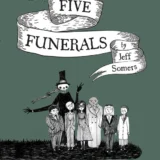
OBIR: Occasional Biased and Ignorant Reviews reflecting this reader’s opinion.

ON SPEC MAGAZINE issue #112, Vol. 30 No. 2.
Publisher: The Copper Pig Writer’s Society. Managing Editor and Art Director: Diane L. Walton.
Issue Designer: Jerry LePage. Poetry Editors: Barry Hammond, and Charlie Crittenden.
Fiction Editors: Barb Galler-Smith, Virginia O’Dine, Madison Pilling, Constantine Kaoukakis, Ann Marston, Laurie Penner, A.J. Wells, Dianne L. Walton, Renée Meloche, Dan Gyoba, Greg Mitchell, and Emily Campbell.
Cover Art by James Beveridge.
FICTION:
Mindwig – by Al Onia
Premise:
James hates teaching first year courses. So, he’s delighted to be assigned a fourth year course instead, Xenobiology 401, which is the study of hypothetical alien life forms based on what we know of life living in extreme environments on Earth.
Review:
James knows nothing about the subject, but figures he and his students can learn together. First he assigns them the task of studying how humans can adapt to environments elsewhere in our solar system where we would be “the aliens.” Disturbed by the results, he next assigns them an even greater challenge.
This is almost entirely concept-driven fiction. Nothing in the way of action. No matter. The characters are not spelled out in great detail, but they are accurate. Middle-aged profs really do fall for girls the same age as their students. Heck, one of my professors ran off with one of his students. A spontaneous sabbatical, so to speak. And James’ eternal quest to spot previously unnoticed patterns and sequences is also authentic. His deductions and conclusions ring true. As a result, the ending is quiet and understated and deeply disturbing the more one thinks about it. Pleasantly unsettling, as befits an academic approach.
The Door Not Taken – by Tyler Goodier
Premise:
Bantu sorcerers long ago conquered Europe. No surprise, then, that the 100-roomed Chateau Manoir des Prés has been the ancestral home of the Ikkila family for centuries. Alas, the current Duchess ikkila is quite elderly and possibly senile, but very active. Her faithful servant Bratati has a hard time keeping up with her. Discovering the hidden door in the pantry is probably something Bratati should have kept secret from the Duchess.
Review:
A delightful fairy tale in which the reader is swept along wondering what will happen next and what the explanation behind it all will turn out to be. My one quibble is that the magic aspects, though often humorous and spritely, don’t strike me as specific to the African background of the story, which suggests it would have worked equally well with a traditional European cultural background. However, it is possible this impression is entirely due to my profound ignorance of African culture. I am aware a common African belief is that sorcerers can influence and control anything, and that might be the strength behind the Duchess’ battle with magical opponents, but whether the details are African-specific or not eludes me. I fear as SF&F grows in diversity and incorporates more and more world cultures I will be left behind, though I hope it is still possible for me to learn.
To sum up, my ignorance aside, the story is consistent within itself and very entertaining. The Duchess is wonderfully feisty.
M2K – by Sana Mojdeh
Premise:
Ella believes in the possibility of pure happiness. She achieved that once, in the presence of a particular man who is no longer available. These days, with the aid of an AI deeply attuned to her emotions, she experiments, searching for a chemical that will produce precisely the right combination of pain and ecstasy to equal happiness.
Review:
At least, I think that is what Dr. Ella is doing. I understand the need to be happy. And since so much of my senior-age happiness is based on nostalgia, I can understand a quest to replicate past experience through any means possible, including chemical, though it seems daft to me. She appears to be sacrificing being happy in her quest to be happy. Even the AI seems on the verge of being miserable at times. I suppose this is a metaphor of some sort to do with every individual’s search for happiness. Perhaps it speaks especially to the expectations of women. I don’t know. I find myself wondering who the heck is funding her research and why? It is a poignant story, to be sure, which I find somewhat depressing, even though there is an implication her quest isn’t entirely impossible. Safe to say I don’t “get it.” Too subtle for me, maybe. Have the feeling it will be quite meaningful for many, though. An interesting take on emotion.
Wing Twist – by Christopher Evens
Premise:
Raymond is sitting in the yard contemplating an unusual swarm of wasps buzzing about the tree in the backyard. His landlord’s son, Gregor, a big believer in the modern German economic miracle, thinks wasps are a waste of time.
Review:
A very short story with an amusing twist. Or a frightening twist. Depends on whether the reader thinks like Raymond or like Gregor. The reader is being asked to choose. Like many modern questions, you’re only allowed either/or. Personally, I’d just advocate staying out of the backyard altogether. Easier when you don’t have to make a choice.
L’Orangerie – by N.M. Billon
Premise:
Life in modern Paris is difficult with the devastating plague ever present. Best to stay inside. But when you need fresh filters for your respirator? Not to mention food?
Review:
There are plenty of people still alive. Trouble is they’re all dying. No more supply and demand. The economy is based on scavenging. As in catch any animal or bird in order to eat it, but be aware that’s what they have in mind for you. As in take whatever you can from anybody else. Doesn’t matter if you kill them. They’re going to die anyway. As will you. But would be nice to die on a full stomach, or at least breathing easily.
Thing is, pity is in short supply. Not practical. What price mercy? Suddenly life has been reduced to simple choices. Many would give up. Others? Carry on as long as they can. What would you do in such dire conditions? This story doesn’t offer a moral lesson. Just an example of a situation where morals no longer apply. This happens in life more often than you would like to believe. I can think of several countries where it is happening now. Fundamentally, when push comes to shove, we’re not at all civilized. That’s the lesson.
In his interview Billon states he wanted to write a realistic apocalyptic story. He succeeded. This isn’t Charleton Heston in The Omega Man. No exaggerated heroes or false expectations here. It’s all too real, and consequently, far more terrifying. Still, it’s possible to read this story and remain optimistic about humanity. Depends on how delusional you are willing to be. But we can all take refuge in the fact that we are safe when we are safe. In a situation like this, however, I suspect I would not fare well.
Cheating the Devil at Solitaire – by Chadwick Ginther
Premise:
John is a Mennonite shunned by his family for his excessively modern ways and unusual powers. Nevertheless his Uncle Frank has called him to the family farm on Christmas day. It is Frank’s custom on special occasions to play Solitaire till he wins. Not winning would be bad, for then the Devil wins and something horrible will happen. Frank has called John in to take over the game.
Review:
There are many variant groups within the Mennonite sect. Some are the traditional horse and buggy types of the popular imagination, others drive cars and tractors. This particular Mennonite household even has a microwave. Nevertheless, drinking and smoking are frowned upon, and simple ways are best. John is entirely too complicated in his tastes to be a proper Mennonite, not least because of his ability to cope with the Devil as if they were equals.
I generally do two things before going to bed. I watch an old SF or monster movie from my collection, then spend half an hour playing Solitaire on my laptop. Consequently I enjoyed this story. Playing to win is always an urgent motivation in this game. That the Devil might be manipulating your deck adds an extra frisson to the outcome. Of course the Devil is a gambler. Of course he cheats. And as this story points out, it is difficult to cheat a cheater, even if you know how to cheat. And cheating at Solitaire ain’t easy.
The story also touches on Mennonite family values. I like the way the fifty-year old farm house is referred to as “the new house.” I like the theme of traditional customs being passed from one generation to the next. Heartwarming, that be. Besides, it’s not often you read the term “the magical Mennonite.” Possibly every family needs one. Quirky, off the wall, yet traditional. Good combination. I like this story.
A Child is Light – by Michael Johnston
Premise:
Lady Evalina, a Highborn, is due to give birth. Her husband is away fighting a war and is not around to protect her. The Sorceress Brotta has detected a shadow on the fetus. It has a Temak. When it is born the pristers will come and take it away, just as they did on her previous birthing day. Of course she will let them. How else can she serve the cause of light gifted by the Father and Mother? But there are rumours a means exist to save the child if she but dare.
Review:
This is fantasy in a somewhat medieval setting, although the basic premise is a product typical of 1950s science fiction. To preserve the purity of the race all mutants must be killed as soon as they are born. Yet this concept is older, in the form of a perceived need to destroy any imperfect child. The ancient Hawaiians practiced this creed. The founder of Family Planning called for it. Hitler made it state policy. I’ve met people who think it’s a good idea. Generally speaking, though, most readers would side with Lady Evalina, want the child to be saved, and despise the pristers as villains. I should hope so.
Lately, given current trends, the focus of women’s rights is on preserving the right to have an abortion, a right increasingly under threat, at least in the United States. This story, however, is about saving a newborn’s life and thwarting the intention of religious authority to kill it. Does this mean the story advocates traditional values in opposition to women’s rights? Not at all. Since it about a woman contemplating a decision in contravention of religious authority, law and custom, it amounts to a plea for a woman’s right to decide the outcome of her pregnancy no matter what the risk to her status, reputation, or even her life. Individual freedom vs. culture-dictated custom is very much the underlying theme. The fear and paranoia felt by Evalina daring to decide her own fate gives the story considerable power.
Ah, but the above interpretation is just the opinion of a garrulous old curmudgeon. At face value the story is a suitable addition to the canon of Grimms’ Fairy Tales in that it speaks to universal desires and instincts under a dark threat. It would be a challenge for Disney to make a family cartoon out of it, but, given their track record, I’m sure they would succeed. Just my silly way of saying A Child is Light is authentically Grimms-like, a fairy tale both meaningful and timeless. Well done.
Library Time – by William A. Turley
Premise:
A five-year-old girl is both very precocious and curiously set in her ways. Everything has to be just so. Her father is very proud of her. But when she suddenly exhibits a desire that everything absolutely must be just so in the day ahead, he begins to worry.
Review:
This is a rather sweet story that will resonate with most parents who’ve enjoyed coping with the imagination and logic of their young children. On the one hand, you don’t want your child to be so overwhelmed with dream-time vision as to lose touch with reality, but on the other hand you don’t want to limit or destroy your child’s imagination. Every parent hopes their child will develop into a wise and gifted adult who will do well in life. Perfectly natural.
Of course, if your child shows signs of being a bad seed, to use an old expression, that’s a worrisome problem. But what if your child shows signs of being exceptionally gifted? What if it turns out your child can do something you could never do in a million years? How do you cope with that? Can you even comprehend it? And even if you can, what do you say to the child?
An interesting conundrum for a parent. I think anyone who has ever raised children will find this story intriguing.
Scales of Justice – by Ryan McFadden
Premise:
Frank Dugas lives alone 200 miles north of the arctic circle. More than just another decaying recluse, he’s a retired Canadian superhero known as Paragon. Nobody knows where he lives. Yet Katrina (aka Cat-O-Nine Tails) found him. Turns out the last supervillain Frank killed is still alive and up to no good. Paragon is needed. Trouble is every time he goes into action innocent people die. He wants nothing more to do with collateral damage. However, his feeble efforts to say no are interrupted by the evil Enginator who unexpectedly shows up to kidnap Katrina. Gosh, darn it! Looks like Frank is going to have to turn back into Paragon after all!
Review:
Needless to say, an amusing spoof of aging superheroes. Can you guess Kismet’s secret power? Point is the story isn’t just a parade of off-beat parody heroes and villains that Marvel could probably turn into credible comic book characters if it wanted to, there are some deft plot twists and turns that add an element of surprise. Or perhaps I should say character twists and turns. Not everybody is an outrageous icon for good or evil. The main characters are driven by quite human motivations and illusions. Personally, Enginator is my favourite of the lot. A very old-fashioned transformer is how I see him. The ultimate Meccano set, and one not noted for subtlety. I’d buy his graphic novel for sure.
Main thing is this story is a lot of fun to read.
NON-FICTION:
Dublin in 2019 or: Did you know that Luas is Irish for “Speed”? – Editorial by Diane L. Walton
A brief glimpse of the recent Worldcon which hosted 6,000 fen. Seems it was quite difficult to get into the “major” events what with long lineups and relatively small rooms, but adopting a habit of targeting events that weren’t full up led to many memorable panels. Avoiding crowded room parties helped keep the ambience calm and relaxed. Would appear that the secret of enjoying a Worldcon these days is avoiding the herd events and thinking small. I’ll keep that in mind in case I ever attend a Worldcon, but I doubt I ever will for a number of reasons including finances. Fun to read about them, though.
One special event Diane insisted on lining up for was an appearance by Spider Robinson. I first saw him and Jeanne when they were busking outside Canada Place during Expo 86. They moved to Vancouver not long after where they became regular fixtures at VCON conventions. Alas, Jeanne passed away a number of years ago. Concerned for his health, I was absolutely delighted to learn Spider made it to Worldcon where he sang, read poems dedicated to Jeanne, and answered questions. I am very happy about this. He’s a great guy and it’s wonderful to learn he is still interacting with his fans at a venue as large as a Worldcon. Reading about this made my day.
N.M. Billon: Writing for the Apocalypse – interview by Roberta Laurie.
A fascinating interview because the author experienced a different, perhaps unique path into his profession. Fresh out of University, he helped run a small theatre company. Not unnaturally, he decided to try his hand at writing a play. The Elephant Song fell into the right hands. It was part of the 2004 Stratford Theatre (in Canada) season. It was subsequently made into a movie for which he received the 2015 Canadian Screen Award for Best Adapted Screenplay. Not a bad start to a writing career I’d say.
Now he’s experimenting with short stories. He likes SF because that’s what he mostly read growing up. He especially likes the challenge short fiction offers because the writing technique required is very different from stage or screen writing. Judging from the quality of L’Orangerie, he is meeting the challenge. You should definitely keep an eye out for further tales by N.M. Billon!
The Art of James Beveridge
A very nice selection of excellent art. You already know how good he is because he did the cover you saw at the top of this column.
Bot and Comic – by Lynne Taylor Fahnestalk
Both great examples of Lynne’s wonderful sense of humour.
CONCLUSION:
The usual highly entertaining mix of SF and Fantasy, some of it dark, some of it light and spritely. On Spec is a mainstay of Canadian Speculative Fiction. A very necessary institution. Can’t go wrong when you grab a copy of On Spec. Guaranteed good reading. Quality stuff.
Check it out at: < On Spec issue 112 >
P.S. The Writers Union of Canada recently drew attention to “reports that indicate a 50% drop in sales for Canadian-authored books, a 20% drop in the borrowing of Canadian books from libraries, and a 78% income decline for Canadian authors over the last two decades.”
I certainly hope my reviews haven’t contributed to this unexpected trend! Would hate to be the final straw.
I cling to my assumption that my reviews contribute in some small way to the survival of Canadian genre fiction. Better yet, let’s get a revival going. Lot’s of great Canadian writers out there. They deserve more readers! Lots more!










Ah, no, Graham. Just making a joke of sorts concerning the down-trend in Canadian readership for literature overall. Compliments are always welcome, of course, but as most writers know, readership response tends to be sparse or non-existent. People too busy reading to find the time to respond. I just blithely assume somebody out there finds my opinions interesting and carry on regardless of whatever the truth may be.
Besides, the secret of writing is to write to please yourself. Since, presumably, oneself is not uniquely abnormal, this must mean a whole bunch of people out there are bound to be just as appreciative. For me, approval is a closed loop. Any compliment is icing-on-the-cake. The act of writing is reward enough. But thank you and Steve for your compliments. Icing always the best part of the cake.
Your reviews are stellar, and I’m sure the writers and publishers know this, Graeme! And rather than driving readers away, you are actively pulling more readers towards Canadian SF&F! Keep on, my friend!
Actually, I think well-done reviews like these–and the stories they apply to–would help more people get into the reading thing.
But maybe you were fishing for compliments such as these? No matter–still well-deserved.
-GrayJay